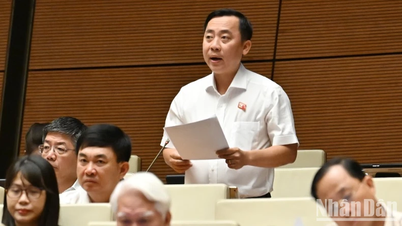 |
| Fathers participating in childcare will have a positive impact in helping to reduce gender imbalance at birth (illustrative photo). |
The "knot" of gender
Thai Nguyen is one of the provinces with a sex ratio at birth higher than the national average for many years. According to the latest statistics, in 2024, this ratio was 116 boys/100 live births (the assigned target was 112.5); in the first quarter of 2025, it was 119.15 boys/100 live births.
Meanwhile, the overall goal of the whole country by 2030 is to reduce the sex ratio at birth to below 109 boys/100 girls. This figure shows that, although communication programs, training, signing commitments... have been implemented, the mentality of "preferring boys and despising girls" still smolders and infiltrates all classes of people.
According to Ms. Ho Thi Thanh Thuy, Head of the Population Department, Thai Nguyen Department of Health: The imbalance in sex ratio at birth (MCBGTKS) stems from long-standing cultural beliefs, combined with the pressure of "having few children, having to have boys", which has led many couples to use sex selection methods. Therefore, despite changes in childbearing policies, if awareness is not changed, the imbalance will still occur.
A nudge for thinking?
For many years, Thai Nguyen has always been among the localities with high birth rates nationwide. In 2024, the province's total fertility rate will reach 2.1 (ie 2.1 children/woman) - ensuring replacement fertility.
However, in general, in the past two years, the national fertility rate has decreased rapidly, from 2.1 children/woman in the period 1999-2022, to 1.96 children/woman in 2023 and 1.91 children/woman in 2024. This is the lowest level in history, and also the third consecutive year that Vietnam's fertility rate has fallen below the replacement level. Therefore, relaxing the regulations on the number of children is a necessary move.
Population experts say: Removing the disciplinary regulation on having a third child will not only relieve pressure on party members but also encourage having enough children to maintain replacement fertility.
From another perspective, when no longer bound by the forms of handling, couples - especially officials - can consider having more daughters, instead of using many solutions to have the desired son.
Agreeing with the above viewpoint, Ms. Tran Ngoc Thu, a civil servant at a provincial department, expressed: The new policy will reduce the psychological pressure of having to "choose the gender of the fetus the first time" - one of the causes leading to the serious gender imbalance today. When there are more choices, people will be less stressed about having to have a son the first time they give birth, as well as not having to find a way to cope when having a third child or more.
However, Ms. Ho Thi Thanh Thuy, as well as many cadres and party members, share the same view: Disciplinary action alone is not enough. That is only one of many necessary pieces to solve the MCBGTKS problem. The core reason is that social thinking has not really changed and the economic pressure in raising children is still very high. Not to mention, a part of today's youth do not want to get married and have children for many different reasons.
Thai Nguyen is a clear example of this. The province has implemented many solutions such as organizing mobile communication sessions, training courses for officials and people, introducing gender equality in schools, health care, and even village conventions. However, the gender equality situation is still high and the set goals have not been achieved.
The reality is that raising a child today is very expensive. Without more supportive policies, people will still be reluctant to have children. The story is not only about the right to have more children, but also the ability to raise children in the most basic conditions.
 |
| Raising a child with a lot of expenses has made many young couples not want to have 2 children (illustrative photo). |
Many difficulties need to be "resolved"
For the policy of “eliminating the discipline of having a third child” to be truly effective, especially in reducing the MCBGTKS, more fundamental solutions need to be taken in parallel. First of all, it is necessary to continue to strengthen education to change perceptions, promote gender education, and integrate gender equality in all levels of education and community activities. The building of the image of women having an important role as men in the family and society needs to be focused on.
The second is to add more financial support policies. Along with the exemption of tuition fees for public high school students just decided by the Politburo, people continue to expect similar policies on healthcare, housing... as well as salary increases for officials and civil servants after the arrangement of the apparatus and administrative units is completed.
Third is the need to strictly handle cases of gender selection. In addition to propaganda, inspection, examination and handling of medical facilities that assist in gender selection must also be drastic, not allowing "lawlessness". In reality, regulations are already in place, "gender selection" still occurs but very few cases are handled...
Removing the disciplinary regulation on having a third child opens the door to many opportunities, but to effectively go through that door, a solid corridor from policy to society is still needed. Especially in localities like Thai Nguyen - where the MCBGTKS rate is still high, the policy needs to be "untangled" from many sides at the same time.
Source: https://baothainguyen.vn/xa-hoi/202504/bo-ky-luat-dang-viensinh-con-thu-baco-giup-can-bang-gioi-tinh-khi-sinh-be54bef/


![[Photo] Prime Minister Pham Minh Chinh starts construction of vital highway through Thai Binh and Nam Dinh](https://vphoto.vietnam.vn/thumb/1200x675/vietnam/resource/IMAGE/2025/5/12/52d98584ccea4c8dbf7c7f7484433af5)


![[Photo] Buddha's Birthday 2025: Honoring the message of love, wisdom, and tolerance](https://vphoto.vietnam.vn/thumb/1200x675/vietnam/resource/IMAGE/2025/5/12/8cd2a70beb264374b41fc5d36add6c3d)
![[Photo] Prime Minister Pham Minh Chinh works with the Standing Committee of Thai Binh Provincial Party Committee](https://vphoto.vietnam.vn/thumb/1200x675/vietnam/resource/IMAGE/2025/5/12/f514ab990c544e05a446f77bba59c7d1)
















































































Comment (0)